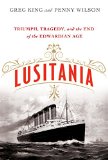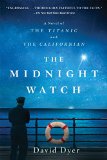Summary | Excerpt | Reviews | Beyond the book | Read-Alikes | Genres & Themes | Author Bio

Triumph, Tragedy, and the End of the Edwardian Age
by Greg King, Penny WilsonGreg King and Penny Wilson's Lusitania placed our readers smack in the middle of history. They smelled the sea water, tasted the decadent food - and felt the horrific explosion as a torpedo hit and then sank the mighty boat. In fact, 18 out of 21 reviewers gave this historical non-fiction 4 or 5 stars.
What are our readers saying about this gripping, true tale?
Lusitania is amazing. I knew just a little about the sinking of the Lusitania and after reading this book I feel as if I were there on the ship. The rich details and tremendous research that obviously went into writing this book make for great reading…I have never read a book before where I felt that it was happening to me. This book really is remarkable (Anita S). The narrative is riveting and well paced throughout, and the analysis of the tragedy is thorough and thought-provoking. In short, I couldn't put it down until I had read it all (Jane A). The tragic story is told in suspenseful and riveting detail. The reader, as an unbooked passenger, observes from a safe distance as the disaster plays out day by day – while helpless to intervene! (Marie D) I do read some books twice...this will be one that I will read again (Dorothy C).
The sinking of the Lusitania is a lesser-known tragedy than the Titanic, and our readers feel as though this book could – and should – change that:
Lusitania, by Greg King and Penny Wilson, is one of the most enjoyable historical books I've read in a while. A lot has been written about the Titanic, but little about the luxury liner torpedoed as WWI was building up. This book is an education. Vividly written with beautiful descriptions of the opulence of the age, I enjoyed every page (Marjorie H). Almost everyone in the world knows the story of the tragic collision of the Titanic and an iceberg in the North Atlantic. This is the story of an equally elegant ship populated by equally affluent and influential people sailing in unbelievable opulence in the opposite direction during a period when most of the Western world was at war (Katherine P). History remembers the Titanic well but the Lusitania is another tragic sea disaster that is equally real and full of loss. This book is brilliantly laid out and full of mesmerizing historical detail (Melissa M).
Most of our readers felt like this book was a unique combination of great research that reads like a story:
I don't read much non-fiction, and I love getting lost in a story. Fortunately for me (and for any other readers) Lusitania tells a story – a riveting, transfixing story. Greg King and Penny Wilson did their homework. This book is so well researched, I can't imagine anything was overlooked. I felt like I was on the ship myself, and the story read like one of my beloved novels instead of a factual presentation of an historical event (Judy K). Were the Lusitania and her passengers exposed/sacrificed to danger in order to involve America in World War I? Did the Cunard Line, British Admiralty, and Captain William Turner deliberately place the Lusitania in danger? These questions and more are dealt with in King and Wilson's very informative book…their extensive research help readers arrive at their own conclusions (Annette S). I appreciate how much research these authors put into solving the mysteries surrounding the story and feel as though they gave me a front seat to people's lives as the story unfolded. The story is well written and companionable (Monica G).
Although some readers did feel differently about this fact-packed story:
The book was very interesting to read, however I think it would have worked better as historical fiction. It seemed like they felt they had to include every quote they found. As a result they couldn't weave in an extended story line, which would have made a good book a great book (Carolyn S). I recommend this book as a reference book, not a good story to read. It is full of facts, but there is not the flow of a good, readable story (Jan H). While clearly heavily researched and informational, I found it impossible to find a good reading flow to this book. Details taken in snapshots and corroborated with copious notes were great in small doses (Yolanda M).
But all in all, they recommend Lusitania to many kinds of readers:
Anyone who enjoys the stories of the Edwardian Age and all its apparent splendor, who is fascinated by the social and technological changes of the early 20th century and who is interested in great human tragedies will find this book extremely rewarding and a fast read (Katherine P). I've never been in a book club, but I think this book would spark a spirited discussion. Good read! (Judy K) I recommend this book to anyone interested in history or just wanting to read a great story (Darshell S). Anyone interested in World War I history will likely find this a good read (Rosanne J). Would recommend it for book clubs, history lovers and even to be used as reading for history classes (Kristen H).
![]() This review was originally published in The BookBrowse Review in March 2015, and has been updated for the
May 2016 edition.
Click here to go to this issue.
This review was originally published in The BookBrowse Review in March 2015, and has been updated for the
May 2016 edition.
Click here to go to this issue.

If you liked Lusitania, try these:

The Mysterious Case of Rudolf Diesel
by Douglas Brunt
Published 2024
The hidden history of one of the world's greatest inventors, a man who disrupted the status quo and then disappeared into thin air on the eve of World War I - this book answers the hundred-year-old mystery of what really became of Rudolf Diesel.

by David Dyer
Published 2017
David Dyer's The Midnight Watch is a powerful and dramatic debut novel - the result of many years of research in Liverpool, London, New York, and Boston, and informed by the author's own experiences as a ship's officer and a lawyer.
What really knocks me out is a book that, when you're all done reading, you wish the author that wrote it was a ...
Click Here to find out who said this, as well as discovering other famous literary quotes!
Your guide toexceptional books
BookBrowse seeks out and recommends the best in contemporary fiction and nonfiction—books that not only engage and entertain but also deepen our understanding of ourselves and the world around us.